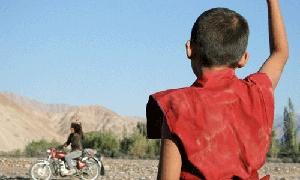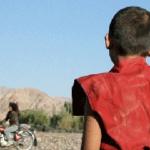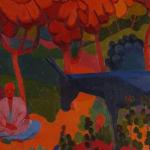Transcending Tragedy at Cinequest 2010
Now in its 20th year, the Cinequest Film Festival, held each year in San Jose, Calif., presents a global smorgasbord of independent films by visionary filmmakers. They run the gamut, from animated shorts to feature-length works of cinematic art, and themes range from the whimsical to the sublime. Each year, ThingsAsian.com features reviews of Cinequest's Asian and Asian-themed entries. This year, six films were available on DVD for pre-screening and review: Complaints Choir, Cooking History, The Desert of Forbidden Art, Raspberry Magic, The Robbers, and Semshook. And although these films are unique in subject and scope, they share the uplifting theme of transcending tragedy.
Complaints Choir
Director: Ada Bligaard-Soby
Producer: Morten Kjems-Juhl
Cinematographer: Josh Nussbaum
Editor: Charlotte Munch Bengsten
Cast: Oliver Kochta-Kalleinen, Tellervo Kalleinen
Country: Denmark, Finland
Language: English
Running Time: 57 min
Genre: Documentary
North American Premiere
Music and misery come together in this inspired documentary, in which Finnish performance artists Tellervo Kalleinen and Oliver Kochta-Kalleinen travel the world to gather the complaints of people from various countries, transform them into a chorale composition, and conduct a musical concert performed by the complainers themselves. Having gathered complaints from twenty-four countries to date, in such far-flung places as Budapest, St. Petersburg, Jerusalem, and Juneau, Complaints Choir is now part of a worldwide movement toward personal and sociological transformation.
According to the Complaints Choir website, "It all got started during a winter day walk of Tellervo Kalleinen and Oliver Kochta-Kalleinen in Helsinki. Perhaps it was due to the coldness of the day that they ended up discussing the possibility of transforming the huge energy people put into complaining into something else. Perhaps not directly into heat - but into something powerful anyway. In the Finnish vocabulary there is an expression "Valituskuoro". It means "Complaints Choir" and it is used to describe situations where a lot of people are complaining simultaneously. Kalleinen and Kochta-Kalleinen thought: ‘Wouldn't it be fantastic to take this expression literally and organise a real Complaints Choir!'"
Directed by Ada Bligaard-Soby, with a grant from the Danish Film Institute Nordic Film and TV Fund, Complaints Choir, the documentary, showcases the process of forming Complaints Choirs in Chicago and Singapore. The film toggles back and forth between the two cities, as the locals arrive to register their complaints and help shape them into a choral performance. Fifty-two complainers/singers showed up for the Chicago production, and fifty for the production in Singapore. Their complaints range from the picayune: "My boss prints his spam and hands it to me."...to the political: "Why do we need a permit to sing our complaints?" ...to the profound: "Every day I lose my lighter and can't light a cigarette from the Eternal Fire!"
Tucked in the middle of the film is a segment on a movement led by Will Bowen, author of A Complaint Free World: How to Stop Complaining and Start Enjoying the Life You Always Wanted, which comes with a Complaint Free Bracelet to be worn as a constant reminder for the wearers to be mindful of their complaining and to work toward breaking the destructive habit.
Back in Singapore, the red tape is piling up as the Singapore Complaints Choir faces one bureaucratic road block after another. It begins with an attempt to procure a permit for the choir to perform, which in itself is difficult. However, it is further complicated by the fact that the choir includes Malaysian singers, who are prohibited to participate due to racial prejudice. Ultimately, as mentioned at the beginning of the Singapore Complaints Choir video, "One day prior to the planned premiere, the local authorities decided that The Singapore Complaints Choir would not be allowed to perform in public." Now THAT'S something to complain about!
Cooking History
Director: Peter Kerekes
Producer: Ralph Wieser
Writer: Peter Kerekes
Cinematographer: Martin Kollár
Editor: Marek Sulik Music Marek Piacek
Country: Austria
Language: German, Russian and French with English subtitles
Running Time: 88 min
Genre: Documentary
"In the army, the closer to the pot, the better."
In the words of Napoleon Bonaparte, "An army marches on its stomach," and it has never been more evident than in Cooking History, an intimate portrait of the military cooks who fed the armies of six countries through six wars, including World War II, and conflicts in Algeria, Hungary, Czechoslovakia, the Balkans and Chechnya.
The film begins with reminiscences of a young man from the catering division in the 1994 war in Chechnya. He recalls that his only provisions were sugar, porridge and lard. No meat, no vegetables. And even the sugar and lard were confiscated by the upper ranks and traded for whiskey. Thus the army had to resort to butchering a local cow, and from it, the young man made Shashlik, Russian beef kebabs. The segment ends with his recipe: 1 small cow. 10 liters red wine, 10 liters grape juice, 12 kg tomatoes, 0.7 kg paprika, and a pinch of salt.
After each segment, an army helicopter air-lifts a field kitchen to the next location. The second segment features the recollections of several World War II bakers. To illustrate the magnitude of just how much it takes to feed an army, the recipe for Kommisbrot bread for eighteen million German soldiers calls for 4,500 tons of flour, 1,350 tons of baking yeast, 2,385,000 litres of water, 1,575 tons sourdough mixture...and a pinch of salt.
An old woman on Russia's Vasilevsky Island recalls her bread-making memories as well, a time when the daily ration of Russian black bread was 100 grams (two meager slices).
Finally, a Jewish concentration camp survivor and member of the Nuremberg vengeance group tells his chilling tale of baking 1,001 loaves of bread with a recipe that calls for eight liters of arsenic to poison the German SS officers in a post-war POW camp.
In Hungary, a sausagemaker recalls making breakfast for the occupying Russian army with a recipe for Magyaros Kolbasz.
During the Algerian conflict of 1954, a French-Algerian chef makes Coq au Vin from a recipe that calls for such luxuries as brandy and red wine.
When war breaks out in 1968, the Warsaw Pact armies converged on Czechoslovakia, where the military cooks made Pickled Mushrooms gathered from the local countryside.
In Yugoslavia, Col. Branko Trbovic, biochemist and nutritionist at the residential estate of Josip Broz Tito, recalls the lavish state dinners attended by such political luminaries as Josef Stalin, Fidel Castro and JFK.
Baked Veal is the fare an army of Croatian soldiers, while their Serbian counterparts dine on Pork Paprikash Stew.
And finally, a navy chef prepares Schnitzel in a tiny galley aboard the Hai submarine as it takes on water and sinks into the North Sea. Of the twenty-member crew, he was the only survivor.
Despite its dark context, Cooking History is an historic and culinary delight. It is both humorous and tragic in the wry wisdom and poignant reflections of its participants, and unique in the way that they are transported back through time to the sites where their experiences took place, with special effects to create the illusion that the battles still rage around them. With its brilliantly inspired perspective through the eyes and memories of this rare group of individuals, its flawless documentary research, and artful production, Cooking History is a work of true genius.
The Desert of Forbidden Art
Director: Tchavdar Georgiev, Amanda Pope
Producer: Tchavdar Georgiev, Amanda Pope
Writer: Amanda Pope, Tchavdar Georgiev
Cinematographer: Alexander Dolgin, Gennadi Balitsk
Editor: Tchavdar Georgiev Music Miriam Cutler
Cast: Sir Ben Kingsley, Edward Asner, Sally Field
Country: Russian Federation, United States, Uzbekistan
Language: English
Running Time: 80 min
Genre: Documentary
Within the borders of Uzbekistan, in the remote Kyzylkum Desert, on the shores of the Aral Sea, Nukus, the capital city of the Republic of Karakalpakstan, is home to one of the world's largest and rarest collections of modern art.
The Savitsky Collection is the vision of archaeologist and collector Igor Savitsky, and The Desert of Forbidden Art, the documentary that tells the story of how this remarkable gallery came to be, is the vision of filmmakers Tchavdar Georgiev and Amanda Pope. With Ben Kingsley, Ed Asner, Sally Field, and Igor Paramonov lending their voices to passages from the diaries and letters of Savitsky and the artists who created some of the works in his collection, interviews with their relatives and descendents, and segments by New York Times correspondent Stephen Kinzer, The Desert of Forbidden Art pieces together sixteen years in the life of Igor Savitsky, from his arrival in Karakalpakstan in 1950, to the opening of the museum in 1966.
Under the oppressive regime of Communist Russia, at a time when only state-approved art was sanctioned for display, the Russian Avant-Garde movement was at its zenith in the desert enclave of Karakalpakstan, where many individuals risked their freedom, and even their lives to pursue their artistic vision. But in a bold maneuver, Savitsky negotiated one of the most daring transactions in the history of art by craftily convincing the Uzbek authorities to approve the purchase of "state-approved" works with government funds, while secretly using the money to purchase these Russian Avante Garde works instead.
Dubbed 'Le Louvre des steppes' by Télérama magazine, the Savitsky collection includes approximately 90,000 paintings, sculptures, artifacts, textiles and jewelry by both ancient and contemporary artists and artisans.
With its impeccable research, exquisite cinematography, and flawless editing The Desert of Forbidden Art is storytelling at its best, and affords an otherwise impossible entry into this dazzlingly creative and colorful world. Both the collection and the film are brilliant.
Raspberry Magic
Director: Leena Pendharkar
Producer: Megha Kadakia
Writer: Leena Pendharkar
Cinematographer: Jeffrey Chu
Editor: Zack Arnold
Music: Jesse Clark
Cast: Lily Javaherpour, Meera Simhan, Ravi Kapoor, Keya Shah, Bella Thorne
Country United States
Language: English
Running Time: 88 min
Genre: Drama
Raspberry Magic is a family drama surrounding the life of eleven-year-old Monica Shah, an Indian girl who lives with her parents and sister in Silicon Valley; a girl who is confused and troubled by the recent changes in her world. As Monica lovingly cultivates a batch of raspberry vines in hopes of discovering whether they will exhibit a positive response to human touch, the fabric of her existence is unraveling one thread at a time.
Her academic arch-rival has sabotaged her hydroponic project for the science fair, her father has been laid off from his job as a game developer and has abandoned his family in a fit of anger, the rejection of her mother's cookbook manuscript has sent her spiraling into a deep depression, her little sister has stopped eating and bathing, the house is in a shambles, the plumbing is leaking, and her best friend Sarah's dysfunctional home life is no better than her own.
Yet despite this abysmal state of affairs, young Monica shoulders the burden of maintaining some semblance of order in the household, all the while keeping vigil over her raspberry plants. But in the days before the science fair opens, Monica worries that her project may not come to fruition in time for the big event. Her only hope hangs on a single raspberry.
With a fresh-faced performance by Lily Javaherpour, the supporting talents of veteran television actors Ravi Kapoor and Meera Simhan in the roles of her parents, and Monica's raspberries as a metaphor, Raspberry Magic is a heartfelt vignette that casts a spotlight on the importance of nurturing relationships. Its unpretentious cinematography, screenplay, and performances create a realistic portrait of family life in an increasingly competitive world, one in which not everything can be measured in scientific terms, least of all, the power of love.
The Robbers
Director: Yang: Shupeng
Producer: Cindy Lin Mi
Writer: Yang Shupeng
Cinematographer: Zhou Shuhao
Editor: Fang Lei Music LV Jiajia
Cast: Hu Jun, Jiang Wu, Lee Lichun
Country: China
Language: Mandarin with English subtitles
Running Time: 92 min
Genre: Action
North American Premiere
Life is good in Bamboo Grove, a rustic Chinese village in the ancient Tang Dynasty (618-907), where its citizens go about the daily business of cultivating rice, tending livestock, crafting utensils, maintaining households, and collectively raising the town's only orphan. That is, until Xue Shisan and Chen Liu, two vagabond brothers, passing themselves off as hunters from Qing Yang Wei, come wandering into town, bringing evil and suffering to a once-peaceful community of peasants.
They first beg a drink of water from MaQi and his daughter Luo Niang, but the ruse turns to robbery when Shisan demands money from the old man. But before the larcenous deed is done, a band of menacing soldiers arrive to plunder the village. In an instant, the brothers spring to the defense of the helpless townspeople, brandishing swords and unleashing swift arrows.
When the battle subsides, instead of being hailed as heroes, Shisan and Liu are jailed for robbery and punished with 20 lashes. In the fast-paced plot that follows, a daring escape lands them in a pit, where they are trapped until they promise their treasure in exchange for freedom, only to be captured yet again. Over time, between arrests and escapes, the two are warily befriended by the townspeople, and they even fall in love. But as the lives of the villagers and the robbers grow more closely entwined, their perspectives and their destinies are changed forever.
The Robbers is an excellent portrayal of life in early China. Rustic sets, props, and wardrobes lend an air of authenticity to the production, yet within the context of an historically brutal era, hammy performances by brother Cheng Liu and the village elder add an element of humor to an otherwise dark tale. The Robbers is rollicking, riveting, romantic, and there's never a dull moment.
Semshook
Director: Siddharth Anand Kumar
Producer: Francisco Leria
Writer: Sudip Sharma, Rahul Singh
Cinematographer: Thribhuvan Babu
Editor Satyajeet Gazmer Music Andrew T. Mackay
Cast: Tenzin Younden, Tenzin Choedon, Tensin Woebhum, Francisco Leria, Andrew Mackay, Bhusan Kulsreshtha, Natasha Rastoghi
Country: Spain
Language: English, Hindi and Tibetan with English subtitles
Running Time: 115 min
Genre: Drama
World Premiere
"I'm tired of singing the national anthem of a nation that doesn't exist," laments Tenzin, a young man of Tibetan heritage, after yet another public commemoration of Tibet's futile struggle for independence. So, on March 10, 2009, the 50th anniversary of the Dalai Lama's exile from Tibet. Tenzin abandons his goldfish and his girlfriend, straddles his Royal Enfield motorcycle and sets out on a journey of self-discovery, from his hometown of Dharamsala, India, across the Himalayas to Tibet.
However, his idealistic pilgrimage is fraught with unforeseen perils, as he is met at every turn by thieving motorcycle bandits, treacherous roads, and hostile border guards. Yet he perseveres in his quest, all the while eloquently chronicling his escapades in a leather-bound journal that grows more battered with each passing day. But his story reaches a turning point upon a visit to his estranged father's widow, where the last piece of his family puzzle finally falls into place. It's time for Tenzin to go home...to Tibet.
Semshook, the meaning of which is revealed at a pivotal point in the film, is as picturesque as it is profound. On both a personal and global scale, it touches upon both aspects, illuminating the individual, without belaboring the political. And set against a cinematic backdrop both forbidding and resplendent, Semshook is a film as transcendent as the Himalayas themselves.
 ThingsAsian
ThingsAsian




















